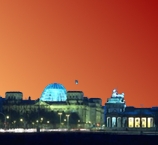A foreign concept
"High sentence for murder of foreigner" read the headline in Die Welt on 31 August regarding the conclusion of a murder trial. The report wrote of the speedy trial of three youths, two aged 16 and the third 24, who beat an innocent man, Alberto Adriano, to death, purely for racial reasons. After only 11 weeks the following judgement was served: the 24-year-old, Enrico H received a life sentence and the others were accorded sentences of nine years each. "The judgement is becoming of the gravity of the crime and sends a clear message to all those who would commit acts of violence," the president of the Land of Sachsen-Anhalt, Reinhard Höppner (SPD), said.
Where, however, is the judgement for those who would call a man who lived in Dessau since 1980, married a German woman and had a family a foreigner? While Alberto Adriano came from Mozambique, was he not a German at the time of his death? Those who stand out based on race become the targets of the violent acts of so-called right-wing radicals. Thus, the debate in Germany revolves around how to curb and change the attitude of such radical groups in German society.
What, however, are we to make of a headline in a mainstream newspaper, which does not recognise immigrants as its own? The headline implies that Die Welt accords Adriano similar status as those who killed him. To most Germans, Adriano's death was extremely regrettable-a tragedy. But alien to many Germans is the concept that Adriano should never have been referred to as a foreigner.
Czech nuclear safety fears
Talks between Austria and the Czech Republic on the Temelín nuclear reactor are growing more heated. (Frankfurter Allgemeine Zeitung, 31 August, Die Welt, 31 August) The Freedom Party (FPÖ) called the reactor a "heap of scraps" (ein Schrottreaktor) and demanded that it be checked according to the guidelines and standards of the European Union (EU). There is a certain irony that 14 countries placed sanctions on Austria because of EU standards, while Austria wishes to adhere so strictly to these standards in other regards.
With this insistence that the Czech Republic's entry to the EU be tied in with the fate of the Temelín reactor, Austria has lost the support of Czech politician, Václav Klaus. "If Austria is indignant regarding how the country is treated by the European Union," Klaus said, "then I will start right now, to be indignant over Austria." It should be mentioned, that while Czech President Václav Havel dislikes the Temelín reactor plan, he does not think that this issue should be related to entrance to the EU.
The Czech Republic insists, according to the Deputy Foreign Minister, Pavel Telička, that Temelín does follow "Western" safety standards. He asked why the Czech Republic would want to endanger its own citizens with an unsafe reactor.(Frankfurter Allgemeine Zeitung, 31 August) It didn't seem to occur to him that perhaps it would be wise to follow additional safety measures, in accordance with standards laid down by the EU. This would be especially sensible considering that the reactor was built according to a Russian design and is of a similar type to the infamous Chernobyl plant. Conforming to Russian safety standards only leads to ever more questions, not assurances.
Russia's ingenious plan...
Russia, however, has had an idea to help boost their budget. Die Tageszeitung and Frankfurter Allgemeine Zeitung report that Russia would like to import nuclear waste. The minister of atomic energy, Jewgenij Adamow and his representative, Walentin Iwanow, have concluded that Russia is big enough to import nuclear waste and dispose of it safely, in the far-away expanses of Siberia. Adamow also stresses that Russia has "experience in nuclear energy." (Frankfurter Allgemeine, 31 August) Substitute the words "nuclear energy" with "nuclear fallout" and the Russians have it just about right.
Let us all rest sound in our beds, knowing that Russia is willing to take care of the world's plutonium.
This plan directly concerns Germany, as Siemens is willing to sell a plutonium factory in Hanau to Russia. The Hanauer factory was built in 1990 but never used. Germany, however, does not oppose Russia's plan, says the Federal Minister of Economy, Werner Müller. Die Tageszeitung rightfully points out that perhaps they should. Plutonium, can be used as an ingredient in the making of weapons. Adamow and Iwanow would like to convince us, that if Russia takes care of this substance, it will not fall into the wrong hands.
According to Iwanow, "Plutonium in the hands of terrorists can be a weapon more dangerous than a nuclear power plant." However, to many plutonium in the hands of terrorists, is however, only marginally more frightening than plutonium in the hands of Russians. Still, the plan would bring Russia money-money they say would be used toward upgrading the country's crumbling infrastructure. In short, disasters like the Kursk and the Ostankino fire could be prevented by importing of nuclear waste.
Andrea Mrozek, 4 September 2000
Moving on:
- Read a summary of events in Germany last week
- Read this week's article on the Germans authorities' moves to counteract the radical right
- Browse through the CER eBookstore for electronic books
- Buy English-language books on Central Europe through CER
- Return to CER front page
Sources:
Frankfurter Allgemeine Zeitung (print edition)
Der Speigel
Süddeutsche Zeitung
Die Tageszeitung
Die Welt




